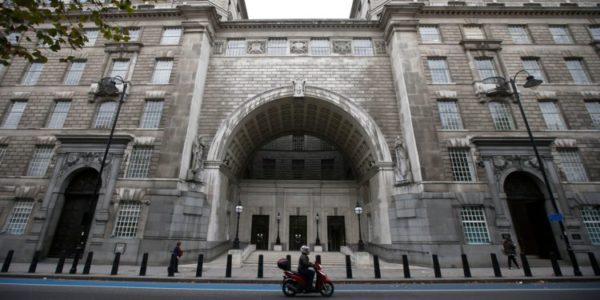New declassified files reveal Black Britons were actively discriminated against in the 1960s, as senior intelligence officials believed they were a “security risk” and couldn’t be trusted in high-level spying roles for the UK government.
The documents, uncovered by University of Salford professor Dan Lomas, exposed intelligence agency MI5‘s deep distrust of Black people during a time when the Labour government was considering introducing racial equality legislation in 1967, according to The Guardian.

MI5 officials believed Blacks had a “chip” on their shoulder that made them more susceptible to being recruited by foreign governments to spy on Britain. (Photo by Reuters/Peter Nicholls)
Lomas said he was taken aback by the findings, as there was a “surprising omission” of any security concerns about Black people in the agency’s official history.
“Since the 1940s, there were bans on communists and fascists working in government,” he wrote. “Then, in the 1950s, this was extended to what was described as ‘character defects’, such as homosexuality, mental illness and alcoholism, on the grounds that this would make people vulnerable to blackmail — but these papers reveal the officials also saw race as a security issue.”
“The discussions around new legislation on racial discrimination being introduced in the 1960s seem to have presented a threat to the established, but unspoken, rule that Black people risked national security,” Lomas added.
While the government had begun recruiting Black Brits into junior or menial positions, they were rarely, if ever, trusted with top secret documents, files show. Moreover, minutes from a Cabinet meeting attended by the head of the Ministry of Defense, a senior civil Treasury official and then MI5 director general, Martin Furnival Jones, among others, revealed the agency’s concern that Black people were more likely to become disgruntled over strained race relations in the UK and thus were more susceptible to flip and spy for another country.
As reported by The Guardian, “MI5 believed the risks of employing ‘colored staff’ stemmed ‘simply from the colour of a man’s skin, which gave him a chip on his shoulder. It would be a long time before this chip was removed.'”
Among their biggest fears was that Blacks might be recruited by the Kremlin to spy on Britain. However, Lomas noted there was nothing in MI5’s declassified files to suggest that there were ever any Black Britons spying on Britain at the time.
“Their relatively small numbers in Whitehall and junior positions would have made them of limited use to the KGB anyway,” the professor of international history said.
The agency was also concerned that hiring Blacks and other racial/ethnic minorities for secret posts posed a threat to national security, as they lacked the usual information needed for background checks. Lomas says Black folks weren’t the ones intelligence officials needed to be worried about, however.
“Ironically, the real threat had come from elite members of the British establishment, the so-called Cambridge spy ring who had been passing British secrets to the Soviets, or intelligence officials and civil servants who had been blackmailed or passed information for ideological or financial rewards,” he told The Guardian. “Nevertheless, the suggestion here is that MI5 simply did not employ Black people.”
Fast forward to 2018 and MI5 is still severely lacking in melanin. A report published by the parliamentary intelligence and security committee earlier this year showed there was a shortage of Black and Asian senior staff employed by British spy agencies. What’s worse, neither MI6, which handles overseas intelligence gathering, nor MI5 had anyone of Black, Asian or minority ethnic background employed in top positions in 2016-2017.
“To discover that this has been a long-running issue is not surprising considering what the recent report said,” said Jabeer Butt, who heads the Race Equality Foundation. “It shows yet again that things are not changing and haven’t for a very long time.”
Of the papers, Butt told The Guardian, “they show that identity has always been a big part of who has been appointed, yet history shows those who have gone on to betray the country have nearly always been white British men.”


